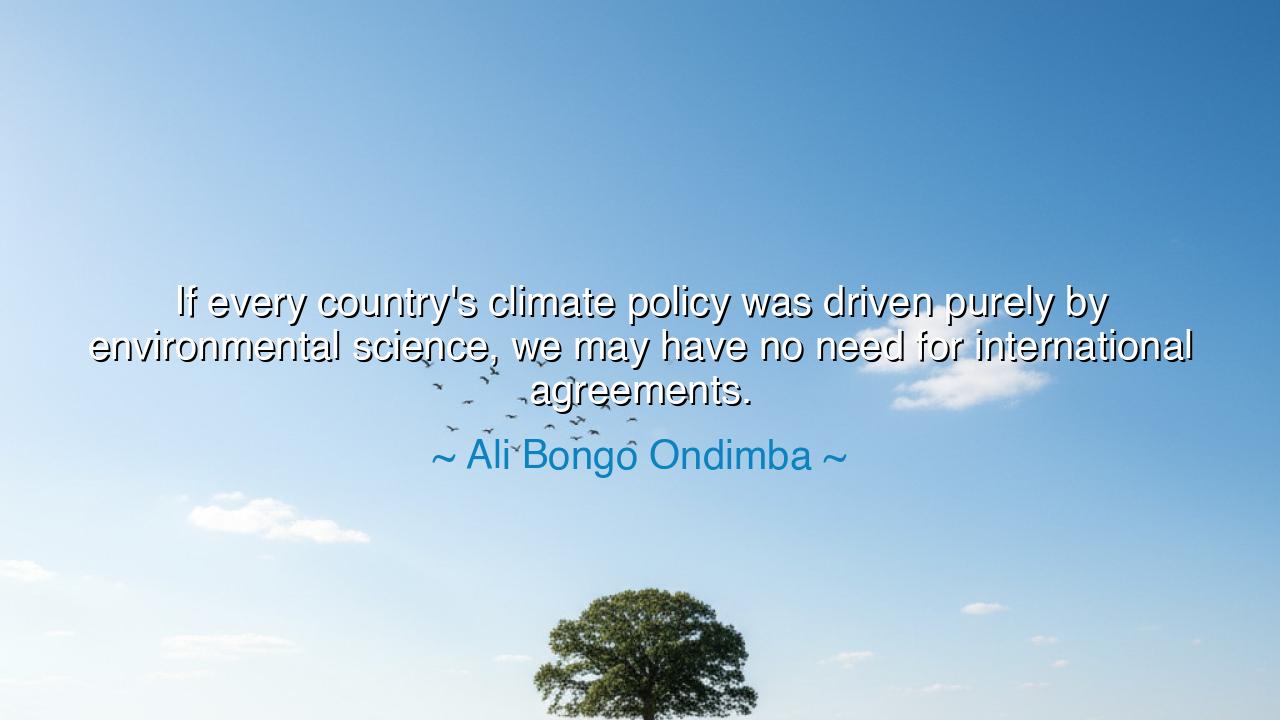
If every country's climate policy was driven purely by
If every country's climate policy was driven purely by environmental science, we may have no need for international agreements.






Hear, O children of tomorrow, the words of Ali Bongo Ondimba, a leader who gazed upon the fate of the earth and spoke thus: “If every country’s climate policy was driven purely by environmental science, we may have no need for international agreements.” These are not words of despair, but of longing—a vision of a world where truth alone guides policy, where nations act not from greed or rivalry, but from fidelity to the knowledge of the earth itself.
The meaning lies in the tension between science and politics. Environmental science tells us plainly what must be done: reduce emissions, preserve forests, protect oceans, and live in balance with the planet that sustains us. Yet nations are not guided by science alone—they are guided by commerce, ambition, fear, and the endless struggle for power. Thus arises the need for international agreements: pacts and treaties to bind reluctant hands, to compel what conscience and reason should already command. Ondimba’s words remind us that the agreements exist not because the truth is unclear, but because too many choose to ignore it.
History teaches us this lesson through the tale of the Montreal Protocol of 1987. Scientists had discovered that chemicals known as CFCs were tearing a hole in the ozone layer, exposing humanity to deadly rays. The evidence was clear, and though some industries resisted, nations heeded the science and came together to ban the chemicals. This agreement stands as one of humanity’s great triumphs: the ozone layer has slowly healed, and millions of lives have been spared. Yet it required global accord, for not all would have acted had they been left to their own devices. Science showed the path, but politics required a treaty.
So too with the great struggle of climate change. The science is unyielding, a chorus of voices across decades warning that unchecked emissions will scorch the earth, drown coasts, and displace millions. Yet nations move slowly, for to change is costly, and to sacrifice economic power is bitter. Hence we see summits, accords, and endless negotiations, while the seas rise ever higher. Ondimba, whose nation of Gabon guards the second largest rainforest in the world, speaks from a place of urgency: if every nation followed science as faithfully as a compass, there would be no need for such treaties—the earth itself would be safeguarded by each people’s wisdom.
The lesson carved in stone is this: do not wait for others to bind you by treaty when the truth already calls you to action. Treaties are crutches for the unwilling. True honor lies in acting rightly without compulsion. Just as a virtuous man needs no law to tell him not to steal, so too should nations need no pact to tell them not to poison the earth. Science already cries the truth—what remains is whether humanity will obey.
What then must we do? As citizens, support policies grounded in science, not in fear or short-term gain. Choose leaders who listen to the warnings of researchers, who shape laws not by the whispers of lobbyists but by the clear voice of evidence. In daily life, live as though no treaty compels you, but as though the survival of the planet rests upon your shoulders. Reduce what you waste, protect what you can, plant, conserve, and defend. Let your own actions be a personal agreement with the earth.
And remember this, O heirs of the future: international agreements are only as strong as the honor of the nations that sign them. Do not despise them, for they are tools of necessity. But strive for the higher calling—to live by truth without being forced, to follow environmental science not because law demands it, but because wisdom does. For in this lies the hope that one day, as Ondimba envisions, the treaties may no longer be needed, and humanity will walk in harmony with the earth by choice, not by compulsion.






AAdministratorAdministrator
Welcome, honored guests. Please leave a comment, we will respond soon